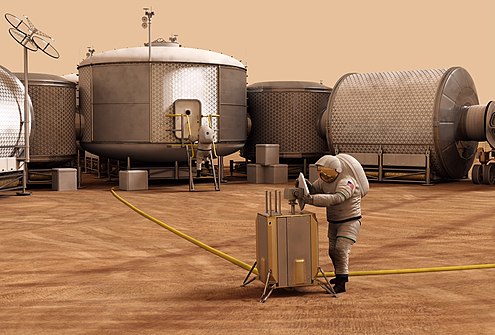Living on Mars: Bioengineering Solutions
Living on Mars: Bioengineering Solutions

The dream of establishing a human presence on Mars is no longer confined to the realm of science fiction. As technological advancements continue to push the boundaries of human exploration, the concept of living on Mars has transitioned from an audacious idea to a realistic possibility. However, the harsh conditions of the Red Planet present a myriad of challenges that must be overcome. Bioengineering, a field that fuses biology and engineering principles, offers innovative solutions to address these challenges and pave the way for sustainable Martian colonies.
One of the most critical challenges of living on Mars is the planet's thin and unbreathable atmosphere. Earth's atmosphere contains oxygen necessary for human respiration, while Mars' atmosphere is predominantly composed of carbon dioxide. Bioengineers are exploring the possibility of genetically modifying plants to thrive in Mars' conditions and release oxygen into the atmosphere through a process known as photosynthesis. These engineered plants could potentially transform the Martian atmosphere over time, making it more suitable for human habitation.
Another pressing concern is the limited availability of water on Mars. While there is evidence of water ice at the planet's poles and underground, accessing and utilizing this water efficiently is a complex task. Bioengineers are researching ways to modify certain microorganisms to extract water from the Martian soil and ice, providing a crucial resource for future colonists.
Furthermore, the radiation levels on Mars are significantly higher than on Earth due to the absence of a robust magnetic field and a thicker atmosphere. Prolonged exposure to this radiation can have detrimental effects on human health. To counter this challenge, bioengineers are investigating genetic modifications that could enhance the body's natural resistance to radiation, thereby safeguarding the well-being of Mars settlers.
The closed and controlled environments of Martian habitats also require sustainable waste management systems. Bioengineers are exploring the use of biological processes to recycle and convert waste into valuable resources. This includes utilizing bacteria to break down organic waste into nutrients for plant growth, creating a self-sustaining ecosystem within the confines of the colony.
While the technical and logistical challenges of living on Mars are immense, the fusion of biology and engineering offers a promising path forward. The interdisciplinary nature of bioengineering enables scientists to design solutions that are both innovative and adaptable to the unique demands of Martian colonization. As we continue to unravel the mysteries of Mars and develop the necessary technologies, the dream of a thriving human settlement on the Red Planet inches closer to reality.
Stay tuned for more updates on the incredible journey toward establishing a new home for humanity on Mars!
Comments
Post a Comment